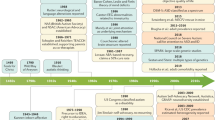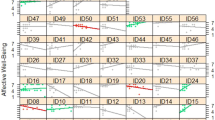Abstract
Objective:
The aim of the present study was to examine to what extent parental psychological characteristics and parental behavior are related to psychological problems in obese youngsters.
Research methods:
Data were collected from 196 families having an overweight youngster (range 10–16 years old) (mean body mass index (BMI)=31.2; s.d.=5.3) seeking weight-loss treatment and compared with data from normal weight samples. Behavior problems were measured using the Child Behavior Checklist; the Child version of the Eating Disorder Examination was used to assess eating disorder psychopathology. Parental psychopathology was measured using the Symptom Checklist-90; parenting behavior was assessed with the Ghent Parental Behavior Scale.
Results:
Parental psychopathology was prevalent in 59.6% of mothers and 35.7% of fathers. Youngsters exceeding the cutoff for problem behavior ranged between 41.4 and 53.1%. Children's problem behavior was most associated with psychopathology in the mother (r=0.40 for Internalizing and r=0.37 for Externalizing; both P<0.01). The research findings further revealed that the effects of maternal psychopathology were partly mediated by a specific form of parenting behavior, namely Inconsistent discipline, although the effect was stronger for Externalizing behavior (explained variance: 10%) than for Internalizing behavior (explained variance: 4%). No evidence was found for a mediator effect from parenting behavior on the eating disorder symptoms of the obese youngsters. However, several direct relations emerged, suggesting a negative association between a child's eating disorder symptoms and Positive parenting behavior by the mother (r=−0.20 for Eating concern; r=−0.18 for Restraint eating; r=−0.16 for Shape concern; all P<0.05) as well as by the father (r=−0.25 for Eating concern; r=−0.25 for Weight concern; both P<0.01; r=−0.21 for Shape concern; P<0.05).
Discussion:
Parental characteristics were associated with psychological problems in obese youngsters, not only in a direct way but also indirectly. The effects were partly mediated by a particular ineffective parenting style, namely inconsistent discipline on the part of the mother. Pediatric obesity treatments should focus more on parenting behaviors and parental characteristics.
This is a preview of subscription content, access via your institution
Access options
Subscribe to this journal
Receive 12 print issues and online access
$259.00 per year
only $21.58 per issue
Buy this article
- Purchase on Springer Link
- Instant access to full article PDF
Prices may be subject to local taxes which are calculated during checkout

Similar content being viewed by others
References
Braet C, Mervielde I, Vandereycken W . Psychological aspects of childhood obesity. A controlled study in a clinical and non-clinical sample. J Pediatr Psychol 1997; 22: 59–71.
Epstein LH, Klein KR, Wisniewski L . Child and parent factors that influence psychological problems in obese children. Int J Eat Disord 1994; 15: 151–157.
Kaslow NJ, Deering CG, Racusin GR . Depressed children and their families. Clin Psychol Rev 1994; 14: 39–59.
Stein JA, Newcomb MD . Children's internalizing and externalizing behaviors and maternal health problems. J Pediatr Psychol 1994; 19: 571–594.
Compas BE, Howell DC, Phares V, Williams RA, Ledoux N . Parent and child stress and symptoms: an integrative analysis. Dev Psychol 1989; 25: 550–559.
Epstein LH, Myers MD, Anderson K . The association of maternal psychopathology and family socioeconomic status with psychological problems in obese children. Obes Res 1996; 4: 65–74.
Zeller MH, Saelens BE, Roehrig H, Kirk S, Daniels SR . Psychological adjustment of obese youth presenting for weight management treatment. Obes Res 2004; 12: 1576–1586.
Favaro A, Santonastaso P . Effects of parents' psychological characteristics and eating behavior on childhood obesity and dietary compliance. J Psychosom Res 1995; 39: 145–151.
Dodge KA . Developmental psychopathology in children of depressed mothers. Dev Psychol 1990; 26: 3–6.
Deater-Deckard K, Dodge KA, Bates JE, Pettit GS . Multiple risk factors in the development of externalizing behavior problems: group and individual differences. Dev Psychopathol 1998; 10: 469–493.
Chamberlain P . Family Interactions. A Social Interactional Approach, Vol. 5. Castalia Publishing Company: Eugene, 1994.
Patterson GR, Reid J, Dishion T . Antisocial Boys. A Social Interactional Approach, Vol. 4. Castalia Publishing Company: Eugene, 1992.
Irivine AB, Biglan A, Smolkowski K, Ary DV . The value of the Parenting Scale for measuring the discipline practices of parents of middle school children. Behav Res Ther 1999; 37: 127–142.
Striegel-Moore RH, Cachelin FM . Etiology of eating disorders in women. Couns Psychol 2001; 29: 635–661.
Fairburn CG, Doll HA, Welch SL, Hay PJ, Davies BA, O'Connor ME . Risk factors for binge eating disorder. A community-based, case–control study. Arch Gen Psychiatry 1998; 55: 425–432.
Hodges EL, Cochrane CE, Brewerton TD . Family characteristics of binge eating disorder patients. Int J Eat Disord 1998; 23: 145–151.
Fowler SJ, Bulik CM . Family environment and psychiatric history in women with binge-eating disorder and obese controls. Behav Change 1997; 14: 106–112.
Wilfley DE, Pike KM, Striegel-Moore RH . Toward an integrated model of risk for binge eating disorder. J Gender, Culture Health 1997; 2: 1–31.
Derogatis LR . SCL-90: Administration, Scoring and Procedures Manual-I for the R(evised) Version. Johns Hopkins University School of Medicine, Clinical Psychometrics Research Unit: Baltimore, 1977.
Arrindell WA, Ettema JHM . Handleiding bij een multidimensionele Psychopathologie-indicator. Swets & Zeitlinger: Lisse, 1986.
Van Leeuwen KG, Vermulst AA . Some psychometric properties of the Ghent Parental Behavior Scale. Eur J Psychol Assess 2004; 20: 283–298.
Fredriks AM, van Buuren S, Wit JM, Verloove-Vanhorick SP . Body index measurements in 1996–1997 compared with 1980. Arch Dis Child 2002; 82: 107–112.
Achenbach TM, Edelbrock C . Manual for the Child Behavior Checklist and Revised Child Behavior Profile. University of Vermont Department of Psychiatry: Burlington VT, 1983.
Verhulst FC, Van der Ende J, Koot HM . Handleiding voor de CBCL/4-18 [Manual for the CBCL/4-18]. Erasmus Universiteit Rotterdam, Afdeling Kinder -en Jeugdpsychiatrie: Rotterdam, 1996.
Fairburn CG, Cooper Z . The Eating Disorder Examination, 12th edn. In: Fairburn CG, Wilson GT (eds). Binge Eating: Nature, Assessment and Treatment. Guilford Press: New York, 1993, pp. 317–360.
Bryant-Waugh RJ, Cooper PJ, Taylor CL, Lask BD . The use of the Eating Disorder Examination with children: a pilot study. Int J Eat Disord 1996; 19: 391–397.
Shavelson RJ, Webb NM . Generalizability Theory. A Primer. Sage Publications, Newburry Park, London, New Delhi, 1991.
Holmbeck GN . Toward terminological, conceptual, and statistical clarity in the study of mediators and moderators: examples from the child-clinical and pediatric psychology literatures. J Consult Clin Psychol 1997; 65: 599–610.
Baron RM, Kenny DA . The moderator-mediator variable distinction in social psychological research: conceptual, strategic and statistical considerations. J Pers Soc Psychol 1986; 51: 1173–1182.
Sobel ME . Asymptomatic confidence intervals for indirect effects in structural equations models. In: Leinhart S (ed). Sociological Methodology. Jossey-Bass: San Francisco, 1982. pp. 290–312.
Berkowitz R, Stunkard AJ, Stallings VA . Binge-eating disorder in obese adolescent girls. Ann N Y Acad Sci 1993; 699: 200–206.
Morgan CM, Yanovski SZ, Nguyen TT, McDuffie J, Sebring NG, Jorge MR et al. Loss of control over eating, adiposity, and psychopathology in overweight children. Int J Eat Disord 2002; 31: 430–441.
Dietz WH . Childhood obesity: susceptibility, cause and management. J Pediatr 1983; 103: 676–686.
Johnson B, Brownell KD, St. Jeor ST, Brunner RL, Worby M . Adult obesity and functioning in the family of origin. Int J Eat Disord 1997; 22: 213–218.
Connell AM, Goodman SH . The association between psychopathology in fathers versus mothers and children's internalizing and externalizing behavior problems: a meta-analysis. Psychol Bull 2002; 128: 746–773.
Stice E . Risk and maintenance factors for eating pathology: a meta-analytic review. Psychol Bull 2002; 128: 825–848.
Epstein LH, Paluch RA, Sealens BE, Ernst MM, Wilfley DE . Changes in eating disorder symptoms with pediatric obesity treatment. J Pediatr 2001; 139: 58–65.
Fitzgibbon ML, Stolley MR, Kirschenbaum DS . Obese people who seek treatment have different characteristics than those who do not seek treatment. Health Psychol 1993; 12: 342–345.
Constanzo PR, Woody EZ . Domain specific parenting styles and their impact on the child's development of particular deviance: the example of obesity-proneness. J Clin Psychol 1984; 3: 425–445.
Acknowledgements
This study was funded by a doctoral fellowship awarded to the first author by the Special Research Fund, Ghent University and by a doctoral fellowship awarded to the fourth author by the fund for Scientific Research – Flanders (Belgium). We thank the Medical Pediatric Center ‘Zeepreventorium’ staff for participating in this study.
Author information
Authors and Affiliations
Corresponding author
Rights and permissions
About this article
Cite this article
Decaluwé, V., Braet, C., Moens, E. et al. The association of parental characteristics and psychological problems in obese youngsters. Int J Obes 30, 1766–1774 (2006). https://doi.org/10.1038/sj.ijo.0803336
Received:
Revised:
Accepted:
Published:
Issue Date:
DOI: https://doi.org/10.1038/sj.ijo.0803336
Keywords
This article is cited by
-
Seesaw Discipline: The Interactive Effect of Harsh and Lax Discipline on Youth Psychological Adjustment
Journal of Child and Family Studies (2016)
-
Psychosocial determinants of quality of life in parents of obese children seeking inpatient treatment
Quality of Life Research (2014)
-
Parents as Agents of Change (PAC) in pediatric weight management: The protocol for the PAC randomized clinical trial
BMC Pediatrics (2012)
-
Teasing and social rejection among obese children enrolling in family-based behavioural treatment: effects on psychological adjustment and academic competencies
International Journal of Obesity (2012)
-
Psychosocial Correlates of Shape and Weight Concerns in Overweight Pre-Adolescents
Journal of Youth and Adolescence (2012)



